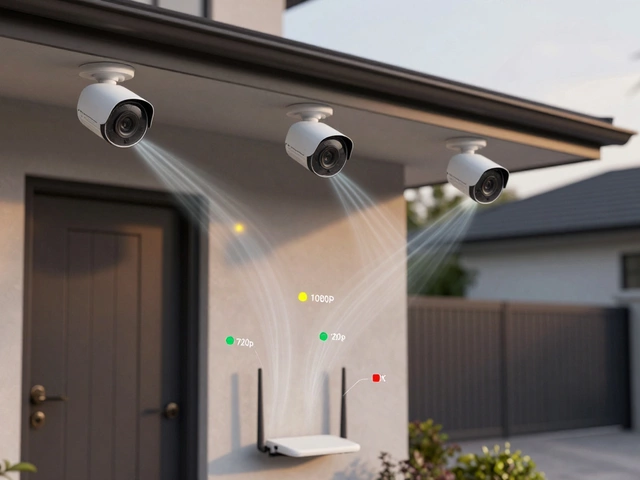Heard about the lawsuit between Vivint and ADT? These are two giants in the home security world. If you own a security camera system, or you’re shopping for one, you might be surprised by what went down.
This isn’t just some court drama for lawyers to hash out. It’s a wake-up call for anyone trusting a big-name company with their home’s security. The lawsuit pulls back the curtain on sneaky sales tricks, fake accounts, and straight-up confusion for everyday folks trying to protect their homes.
It’s easy to assume a well-known brand keeps things above board. Turns out, that trust got shaken up. People like you and me ended up with the wrong company’s contracts, got billed unknowingly, or were convinced to swap systems when they didn’t want to. Not everyone reads the tiny print on tech gadgets, and some salespeople played on that fact.
The main takeaway? Even in 2025, you can’t let your guard down just because a logo looks familiar. Understanding what happened with Vivint and ADT gives you an edge—so you don’t fall for the same tricks.
- Who Are Vivint and ADT?
- How the Lawsuit Started
- What Vivint Did Wrong
- Things ADT Accused Vivint Of
- What This Means for Security Camera Users
- How to Protect Yourself from Bad Sales Tactics
Who Are Vivint and ADT?
If you've ever looked into home security, there's a huge chance you've seen the names Vivint and ADT pop up. These companies are two of the biggest players in the U.S. home security game—almost household names. But they're not just about selling security cameras. They do full-service home alarms, sensors, smart home hookups, monitoring, and all sorts of home tech add-ons.
ADT is basically the granddad of alarm systems in America. The company’s been around since 1874—yeah, not a typo—so they've had a ton of time to get their act together. ADT says they protect more than 6 million homes and businesses. Their blue and white yard signs are everywhere, and they offer professional installation, 24/7 monitoring, and a big support team.
Vivint is more of a tech-focused newer kid—founded in 1999 as APX Alarm, rebranding to Vivint in 2011. They really pushed the "smart home" angle early, so if you like app controls, voice integration, and fancy touchpads, Vivint probably rings a bell. The company has over 1.9 million customers in the U.S. and Canada. Their bright orange branding is meant to stand out against the crowd.
Check out some key numbers for both companies in this simple table:
| Company | Year Started | No. of Customers | Main Focus |
|---|---|---|---|
| ADT | 1874 | 6+ million | Security systems and monitoring |
| Vivint | 1999 | 1.9 million | Smart home security and automation |
Both companies are known for their aggressive sales teams. That’s important, because this is where a lot of headaches started—especially for folks who didn’t know what they were getting into.
So if anyone tells you all big security companies play by the rules, this lawsuit says otherwise. Next, let's get into how trouble started brewing between these two giants.
How the Lawsuit Started
This whole thing boiled over in late 2020, but the complaints had been building for a while. ADT discovered that some customers were calling in, totally confused. They'd signed up for what they thought was a new deal with ADT, but suddenly they were on the hook for a contract with Vivint instead—sometimes without fully understanding what was happening.
The main issue? ADT claimed that Vivint sales reps were tricking homeowners with misleading sales tactics, especially targeting older adults or folks not super tech-savvy. These reps would wear shirts, hats, or badges that looked like ADT’s logo and introduce themselves in a way that made it sound like they represented ADT, not Vivint. There were stories of people being convinced to "upgrade" their current alarm systems, but they'd end up switching companies without knowing it.
This wasn't just a few one-off cases. ADT said these sales shenanigans happened across several states, and enough complaints piled up that they had to take legal action. The lawsuit, filed in Federal Court, accused Vivint of "deceptive trade practices" and tried to stop these sales tactics from continuing. By the end of 2021, over a thousand customer complaints had been gathered about this scheme.
| Year | Reported Complaints to ADT |
|---|---|
| 2018 | 200+ |
| 2019 | 350+ |
| 2020 | 450+ |
| 2021 | 1000+ |
Vivint responded by saying that any bad behavior was the work of “rogue” reps and not official company practice. But with numbers like these, it got hard to ignore.
This whole clash put a spotlight on home security sales tactics and why being sharp about who you’re dealing with at your front door really matters.
What Vivint Did Wrong
So, what exactly got Vivint into hot water? It wasn’t just one slip-up—it was a pattern of questionable moves. ADT called them out for what’s known in the industry as “slamming.” That’s when sales reps allegedly tricked customers into switching services without their actual consent. Some folks thought they were just updating their ADT system, only to find out they’d signed a new contract with Vivint. If you’ve got a home security camera and you’re not sure which company is monitoring it, that’s enough to make anyone uneasy.
The lawsuit described Vivint reps knocking on doors, wearing shirts that looked suspiciously like ADT gear, and even saying things like “we’re upgrading your ADT service.” They’d then get customers to sign up for Vivint instead. Later, people would notice Vivint bills, even though they thought they were still with ADT. That’s sneaky, no way around it.
But that wasn’t all. Another big hit: Vivint also got busted by the Federal Trade Commission for identity theft shenanigans in 2021. Salespeople allegedly used fake credit info so customers would pass Vivint’s internal checks. The charts below show just how big that mess was.
| Year | FTC Complaints | Vivint Fines/Settlements |
|---|---|---|
| 2021 | Over 1,000 | $20 Million |
| 2023 | More than 500 | $12 Million |
Every time this happened, it meant innocent people ended up with bills, dented credit, or surprise security contracts they never actually wanted. These tricks hurt the company’s name, but also put everyday folks’ money and personal info at risk.
- If you’re picking a new security system, double-check who you’re dealing with—ask for ID and don’t rush through paperwork.
- Review every contract detail. Look for company names, cancellation rules, and payment plans.
- If something feels off, step back. No honest rep will push you to sign right away.
Bottom line: Vivint’s trouble wasn’t just legal fines—it was breaking trust with real people. Strong brands don’t get a free pass if their sales crews cross the line.

Things ADT Accused Vivint Of
ADT pulled no punches in their lawsuit against Vivint. They claimed Vivint’s sales reps were tricking people at the doorstep. The number one complaint? Pretending to work for ADT or saying they were sent to "upgrade" existing home security systems. This confused a lot of homeowners, and some ended up signing Vivint contracts without even realizing they’d switched companies.
ADT said this wasn’t just a one-time slip-up. They argued it was a pattern—across different states and for years. Vivint reps allegedly used ADT logos, colors, and even glossy pamphlets that looked just like ADT’s official ones.
- Misrepresenting themselves as ADT affiliates
- Getting access to homes under false pretenses
- Pressuring people to sign new contracts on the spot
- Not properly explaining that customers were changing providers
- Leaving behind contracts that were hard to cancel later
ADT backed up their lawsuit with dozens of customer complaints. Some people reported double billing: they were still getting charged by ADT while Vivint started their monthly fees, leading to hundreds of unexpected dollars lost.
Check out these eye-popping numbers, straight from the lawsuit filings:
| Year | ADT Customer Complaints | States Impacted |
|---|---|---|
| 2022 | 240+ | 34 |
| 2023 | 300+ | 41 |
ADT even said some people felt so pressured they called the police, worried they were being scammed. Remember, both companies run background checks on their installers, but confusion at the door quickly snowballs into bigger headaches.
This didn’t just end with angry phone calls. Federal courts and state attorneys general got involved, putting even more heat on Vivint to change their sales ways. The legal mess shows why it pays to double-check every document in security camera and alarm system deals—especially if a new face appears at your door claiming to "work with" your current provider.
What This Means for Security Camera Users
If you use home security products from Vivint, ADT, or honestly anyone else, these lawsuits should grab your attention. This mess didn't pop up out of nowhere—real customers got pulled in, and it could happen again if we're not careful.
Here’s what stands out. According to court records and news from early 2024, Vivint salespeople tricked some homeowners into switching from ADT to Vivint, even when those customers didn’t want a change. There were reports of fake signatures, fake accounts, and invoices sent to people who had no idea what was going on. ADT said over 9,000 of their own customers complained about being misled—yep, that’s not a typo.
This affects you even if you’re with another company. It shows how confusion can sneak into something as simple as installing some cameras or signing a new contract. Companies can play fast and loose with your info or even chase your business using shady tactics.
On top of that, home security scams aren’t just a Vivint vs. ADT problem. The Federal Trade Commission actually made Vivint pay $20 million in 2023 for similar behavior. Makes you want to double-check who’s actually at your door, right?
So, what’s the lesson here for regular home security users?
- Always check your paperwork before signing. If a salesperson says you’re upgrading with your current provider, call the main company line to confirm.
- Keep an eye on your bills each month for weird charges or new account numbers.
- Don’t be afraid to ask for official ID from anyone wanting to touch your security setup.
- If you’re feeling rushed or pressured, take a step back. Reputable companies won’t mind you double-checking details.
Here's a quick peek at FTC settlements with security companies in the past few years:
| Company | Year | Penalty Amount |
|---|---|---|
| Vivint | 2023 | $20 million |
| ADT | 2020 | $16 million |
So next time someone wants to sell you an upgrade—or seems to know a little too much about your security setup—remember what happened between Vivint and ADT. A simple phone call or a minute spent reading your contract could save you months of annoyance (or a chunk of your wallet).
How to Protect Yourself from Bad Sales Tactics
No one wants to be tricked into signing up for a service they never wanted. The drama with Vivint and ADT proved that even big names in home security can have shady moments. Let’s talk about simple ways you can spot and dodge those sales traps that tripped up so many customers.
- Always ask for ID: If someone comes to your door saying they’re with a security company, ask to see their photo ID and company badge. Real employees won’t get pushy if you double-check.
- Don’t rush: High-pressure sales are a red flag. Never sign contracts on the spot. Take your time to read the details. Sales reps hoping for a quick signature might be hiding something.
- Call the company yourself: If you get a visit or a call from someone saying your current system is outdated (a tactic seen in the Vivint lawsuit), call the customer service number listed on your bill—not the number they hand you.
- Beware of confusing company names: Some bad actors have pretended to be from other companies, especially in the case between ADT and Vivint. Double-check paperwork and logos.
- Watch your credit: One issue the Vivint lawsuit exposed was creating accounts with fake or recycled info, which hurt people’s credit. Keep an eye on your credit reports for any unfamiliar accounts pinned to your name.
- Keep all paperwork: Never toss your old contracts or receipts. If something feels off down the road, having proof really helps when you challenge a charge or report fraud.
In a 2023 study from the Consumer Federation of America, nearly 20% of complaints about alarm or security camera services involved tricked or confused customers—mostly because of aggressive sales tactics or unclear contract terms.
| Common Sales Tactic Problem | How Often Reported | What To Do |
|---|---|---|
| Fake upgrades or inspections | 28% | Confirm by calling company directly |
| Pretending to be a different brand | 19% | Check paperwork and uniforms |
| Forging signatures or contracts | 15% | Never sign blank forms |
Bottom line: don’t take anything at face value, even with long-standing alarm or security camera companies. Stay in control and protect your info. Scams change every year, so a little suspicion goes a long way.


